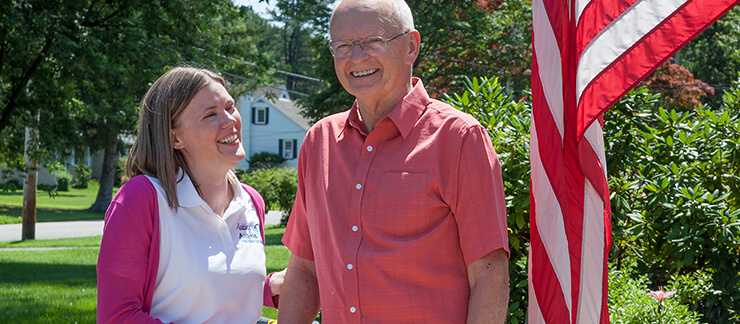
Veterans Choice Program Can Be a Life Saver
One of the first questions you may have about professional home care is how to pay for it. But if your loved one is a veteran, there are routes to coverage through the US Department of Veterans’ Affairs (VA), that don’t exist for most people. Because of the nature of the career, veterans may need care earlier than others, so this is an essential program to know.
If your loved one is not a veteran, or you wish to explore other options for financing, see
Home Care
Professional home care professionals can help your loved one with day-to-day activities. They do not provide medical care but can offer help with things like eating, dressing, bathing, getting in and out of bed, moving around the home, cooking and cleaning. Along with helping around the house, they also provide your loved one with much-needed companionship. Home care
The services received and the frequency at which your loved one receives them are based on his or her needs. And it turns out there’s a useful way to pay for these.
The Veterans Choice Program
Home care can be covered under an initiative called the Veterans Choice Program (VCP). The VCP lets a veteran receive care from a community medical provider, paid for by the VA when the nearest VA facility can't provide that kind of care. The following are other reasons the VCP will cover home care:
- The VA doesn't offer the service needed.
- The VA can’t arrange for an appointment for the service needed within 30 days.
- The veteran lives more than 40 miles from the nearest VA facility.
- The veteran would have to travel by air, boat or ferry to receive treatment.
- The veteran faces an excessive burden in traveling to receive treatment, such as a health condition that makes travel prohibitive.
If your loved one requires home care due to a medical condition, there may be a free choice of whom to use as a professional caregiver through VCP.
Eligibility for the VCP is determined by the VA based on conversations with the veteran’s healthcare provider. You can check eligibility online or call 866-606-8198. The veteran's eligibility for the VCP must be determined in advance, and any additional care needed must be approved by the VA before commencing.
Respite Care
Along with home care, you may be able to
There are many ways the VA can offer respite care:
- Your loved one can attend an adult day health care center
- The senior could stay overnight in a VA community living center (nursing home) for a short period
- A professional caregiver can visit in the comfort of your loved one’s home
The manner of the care is up to you. Your loved one’s medical condition will also be an essential factor in this decision.
Through the VA, your loved one could be eligible for up to 30 days of respite care per year. This can also be taken according to your needs. If you need to travel, it could be one stay of 30 days in a community living center, or it could be 30 single days (up to six hours) of in-home visits from a professional caregiver.
Aid and Attendance Housebound
The VA also runs a program called "Aid & Attendance and Housebound." This program may make additional payments to veterans and their spouses who already receive a pension, to cover extra long-term home care. To be eligible, the veteran must:
- Require help with everyday personal care tasks, such as bathing or going to the toilet
- Be bedridden
- Be physically or mentally incapacitated
More information about this program can be
Eligibility
Eligibility for all long-term home care benefits from the VA is determined based on the veteran’s need for assistance. It may depend on whether the need arises from a service-connected disability. It may also take in to account other factors, such as financial status or any other insurance coverage held.
To apply for VA health benefits, call the VA directly 1-877-222-VETS (8387) or
And for more information on how veterans can help pay for home care services, click here.


